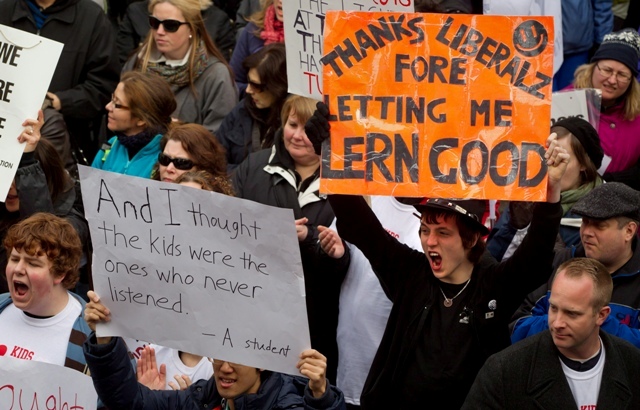VANCOUVER – How many people reading this column could go 20 weeks without a pay cheque, without seriously depleting your savings account or cashing in a significant amount of RRSP funds?

I suspect not many people could, but that bleak scenario is precisely the one facing many teachers in B.C. as the summer progresses.
The teachers were last paid in mid-June, or thereabouts. They may not see another pay cheque until mid-October, unless their union moves significantly off its bargaining position in contract talks.
And yes, I say “union” quite deliberately. That’s because there is no way to pressure or force the government to accede to what the B.C. Teachers Federation is demanding at the negotiating table.
This is not to say that what the BCTF is asking for is not warranted in some respects. Teachers have made a strong and compelling case, for example, that more funding is needed to address issues such as class composition.
Hiring more specialist teachers, to pick just one area, would have a huge and positive impact on many classrooms.
But for all the validity of some of the BCTF’s arguments (these don’t include the ones involving their demand for a greater benefits package) there is no reason at all to expect the provincial government to suddenly fork over almost a quarter of a billion dollars, which is what the BCTF is seeking to address class composition.
I’m not the only observer to point out that in this poker game, the government holds all the cards. Not just the best cards, but all of them.
The government’s ability to legislate an end to the dispute and to impose a new contract gives it the whip hand. The BCTF may well challenge such a move in court, but that will take some time to play out if the union chooses to go down that route.
The BCTF may eventually also ultimately win that ongoing court case about contract language governing class size (it has won in the B.C. Supreme Court, but the government is appealing and a potential further appeal to the Supreme Court of Canada may mean this won’t be resolved for perhaps two more years).
So unless the BCTF leadership crawls back from the edge of the cliff it has been sitting on for months now, the only question becomes one of timing. As in: when will the government impose that contract?
In past disputes, the government has moved relatively quickly to end a strike by teachers, using the legislature to do so.
Not this time.
The government now realizes it has the BCTF just where it wants it. For the first time ever, the union’s membership are paying a huge personal financial price for staging a strike.
And the teachers are paying that price at the worst possible time. The fact the two-month summer break has landed smack in the middle of the strike exacerbates the cash flow problems that can arise from going potentially more than four months without an income.
Government House Leader Mike de Jong is adamant he won’t call the legislature back earlier than its Oct. 6 scheduled start, just to impose a contract. His surprise announcement of a $40-per-lost-school-day-perstudent rebate for parents would seem to buttress that point.
If he sticks to his guns, the earliest date for an imposed contract to take effect would be Oct. 9 (it takes a minimum of three days to pass a bill into law). If teachers went back to work that day, presumably they wouldn’t be paid for two more weeks.
It all adds up to about 20 weeks without a teacher being paid. The unfortunate thing for teachers that it is more than likely the imposed contract will contain pretty much what’s on the table now from the government, which means teachers will have given up thousands of dollars for nothing.
I still think a negotiated deal is possible: the two sides are close on wage proposals, and if the BCTF staggered its argument for funding for class composition over several years (instead of all at once), dropped most of its benefits demands and agreed to put off any grievances until that court case is ultimately settled one way or another, a deal might be in sight.
It might not be totally fair, and it may not give the teachers and their classrooms everything they deserve. But not many labour disputes end up giving everyone what they deserve, and in this case no one deserves to go without an income for 20 weeks.
Keith Baldrey is chief political reporter for Global BC. Email him at Keith.Baldrey@globalnews.ca



Comments